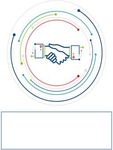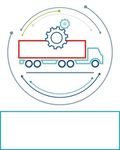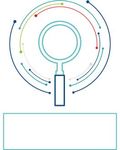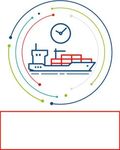INTEGRATING TO DECONGEST THE PORT OF DURBAN
←
→
Page content transcription
If your browser does not render page correctly, please read the page content below
INTEGRATING TO DECONGEST THE PORT OF DURBAN Foreword from the Chairperson It is pleasing to see that in the past year and few months we have seen an improvement in all the KPI’s of the Decongestion Task Team programme at the Port of Durban. However, I have to say that those improvements have not taken us to the worlds benchmarks - where we want to see ourselves. Let us start with the performance on truck turn around time where there has been a vast improvement in both the staging period and turn around time inside the terminal. This is attributed by firstly the adherence to the booking system and the support given by industry to this initiative. Secondly another attribute is the improving number of available straddle carriers to support operations at the Durban Container Terminal – Pier 2. This improvement in fleet availability is driven by factors such as the new straddle carriers that we received late last year and also in the month of May 2021. Those have really helped to stabilize our operations at the container terminal. Despite the technical glitches experienced on these machines, we are hopeful that there is light at the end of tunnel. We are anticipating a busy year for the Maydorn Wharf precinct with an expected two (2) million tons of maize. This will be the highest volumes that we have handled in the recent history. We are therefore working with terminal operators, to have staging facilities outside of the precinct so as to control trucks coming in and out of the port. We expect to see efficient use of the booking system in this area. The reefer season volumes are also expected to be higher than last year due to the rise in demand of citrus as well as the good rain season. These commodities should experience the highest level of operational efficiencies and not be subjected to a congested port environment due to their sensitivity. With the third wave of COVID-19 being here let us maintain being vigilant at all times and adhere to the regulations placed to combat the spread of this virus. I thank you Moshe Motlohi GM at the Port of Durban
INTEGRATING TO DECONGEST
THE PORT OF DURBAN
Executive Summary
1. Establishment of a multi-party work team: The Decongestion Task
Team continues to bring together stakeholders within the industry to
identify challenges, opportunities, craft sound solutions and reviews these
on a bi-weekly basis. Efforts continue being made in ensuring maximum
participation in the bi-weekly task team meetings. With the challenges
sited in the bi-weekly engagements, the next step is to partner with
research institutions as well as innovation hubs to address the recent
inclement weather challenges experienced in the Port. The Task Team
has also come to an agreement with land owners in the Cato ridge and 90%
Hamarsdale area where these areas have been identified as a nice area
for 24/7 back of port facilities, proving the growing collaboration between
the private sector and TNPA towards the decongestion initiative
2. Back of port operating hours & slot booking:An area which has not
performed well is in the setting up 24 hour facilities that will support the
Port. This is an area of concern and we will focus on improving it. It is
encouraging that TNPA has approached private land owners in the Cato
ridge and Hamarsdale area. We have landed on an understanding that
those areas will serve as a nice back of port hub. Bidvest Port Operations
(BPO) is to be commended for being a pioneer in this area for identifying
a staging area in he Harmarsdale area. BPO has further extended an
invitation to other operators to cohabit this space and we hope that
operators will seize this opportunity to collaborate. The mandatory truck
appointment system continues to assist well in the decongestion
initiative. We are pleased to see that other terminal operators in Bayhead
precinct have adopted the boking system. After an analysis on the 80%
precinct it was interesting to see that only 25% of the Precinct operators
have registered however it is wise to understand that, this 25% bring
almost 70% of the volumes that move into that space. This is the
attribute to the less congestion seen on this road. The relevant stream is
now working towards getting the remainder on the operators onto the
booking system. We recently went to go witness an unveiling of a big
unveiling of a PEPKOR warehouse the same area in which a staging area
has been placed. This is a catalyst of which we believe will initiated the
24 hour back of the port facility. We have seen other industry players
doing this and we hope more operators will adopt this model of operating
24/7 so that the Port can continue functioning.
3. Trucking association accreditation & training: The truck induction
programme has commenced but it has been delayed and as the
Authority we have decided to be lenient on those who have missed the
deadline to be accommodated to that they can go through the necessary
process. We will give feedback on this in the next quarter, however we
note that we are on a good footing.
35%INTEGRATING TO DECONGEST
THE PORT OF DURBAN
Executive Summary
4. Container terminal efficiencies: The number of gangs has
improved in Pier 1 and Pier 2. The number of straddle carriers late
last year was 54 and right now has risen to 73. We also note the
receipt of 10 new straddle carriers from China; which were deployed
in the month of May 2021. Staff is being trained to ensure efficiency
in the use of these new machines, and further processes are
underway to ensure the carriers readiness to operate effectively. We
are in high hopes that the reliability factor of our operations system
is going to improve. We have noted that there have been concern on
the systems uptime. Indeed, of late it has been causing problems for
a number of hours. And too frequently the system has been giving a
number of problems. The terminal manager is addressing this issue
with the service provider. It is important that system reliability is 70%
sorted out as we are already in peak reefer season. We assure you
that the teams are working hard at this. The bottleneck in the
procurement of spares in the terminal has been identified and the
team is working towards ensuring that come the next December
holidays they will be able to address issues that have caused some
discomfort around the availability of spares. In conclusion the
accusation of a barge for the PoD is well underway, and a service
provider is in the process of procuring the craft as well as in
discussions with a terminal operator.
4. Increased rail utilisation. On the rail side we are encouraged that
we are now seeing not less than 4 trains coming into Island View
every week, which was not the case last year. This has brought in a
big relief in terms of number of trucks in the road. The plans
currently under way also give a good trajectory where there will be a
good number of trains deployed, which will directly result in a less
number of trucks on the road.
55%
5. Joint stakeholder engagement. We are fast rolling out the Port
Master plan and this plan speaks to a port that will have an
increased container throughput. We encourage for everyone to come
onboard with inputs on how best we can make this growth positive
across the ports eco-system. Collaboration and partnerships remains
the name of the game in the joint stakeholder engagement stream.
Focus remains on ensuring maximum involvement by key
stakeholders in the industry. The membership composition of the
Decongestion Task Team is at its satisfactory level however, the 95%
stream is working on on-boarding stakeholders who can realise some
of the great initiatives championed by the task team. The stream is
also tracking stakeholder sentiments around the task teams
initiatives and it is great to announce that at this stage, the feedback
from stakeholders has been positive, constructive and encouraging.INTEGRATING TO DECONGEST
THE PORT OF DURBAN
Executive Summary
7. Port access roads. I am proud to announce that in collaboration
with the City Transnet has gone out to market for the construction of
the link rod between the Old airport (Durban logistics hub) and the
Port of Durban. In addition to this development, Transnet Properties
has determined that the old airport can be utilized as the back of port
operations site. In it we will be putting industries that will be
supporting the automotive industry in collaboration with Dube Trade
Port. I want to commend the Metro Police who have been a reliable 50%
partner and have brought stability and discipline when it comes to
road users. The truck drivers should be engaged on the frightening
number of fines that are issued every week ( 2000). I want to remind
all of us that with AARTO coming in the trucking business might find
themselves impacted if their truck driver infringement does not
reduce, will result in the suspension of drivers and the availability of
skills. I hope that you will address this matter with your drivers as the
number on offenses goes against their record in turn which might not
allow them to drive on the roads.
8. Root Cause Analysis. Another area which has contributed to the
seen improvements is the forecast maintenance done by the
decongestion root-case analysis team, which is reviving the
maintenance discipline and operating philosophy that aims to
anticipate failures before they occur.
65%You can also read



























































